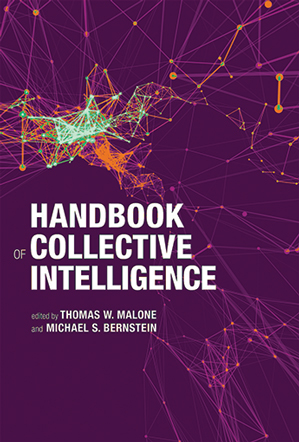Most people are familiar with the way crowdsourcing projects like Wikipedia bring people together to create something that would have been impossible without collaboration on a huge scale. What they may not realize is that there’s a term for that kind of coöperation: “collective intelligence.” People also may not realize that collective intelligence is far more widespread than just Wikipedia.

Edited by Thomas Malone, professor of management, and Michael Bernstein, SM ’08, PhD ’12
MIT Press, 2015, $30
“The past few years have seen a significant increase in the popularity and maturity of collective-intelligence research, but most disciplines are doing so independently,” says Thomas Malone, the Patrick J. McGovern Professor of Management at Sloan and director of the MIT Center for Collective Intelligence. Absent an effort to synthesize these insights across fields, Malone fears redundant research efforts in different academic communities and missed opportunities for interdisciplinary work. “That’s why we are trying to bring these disciplines together into a new interdisciplinary field,” he says. “There’s huge potential to fostering intellectual trade between these areas, not just for academic interests but also with significant practical considerations.” As an example Malone cites the Climate CoLab, which brought together more than 36,000 scientists, businesspeople, and students to crowdsource solutions to climate change.
To promote the concept, Malone has now produced The Handbook of Collective Intelligence, a collection of essays on the latest research from such diverse fields as computer science, biology, and organizational behavior. Coedited with Michael Bernstein, SM ’08, PhD ’12, an assistant professor of computer science at Stanford, the book is designed to highlight similarities and foster cross-discipline collaboration.
The essays take a close look at research being done on collective-intelligence efforts in a variety of disciplines—for example, economics and the study of markets; biology and research on emergent behavior in ant colonies; and human-computer interaction and artificial intelligence. The book has quite a few Sloan-affiliated contributors, including Andrew Lo, the Charles E. and Susan T. Harris Professor of Finance, and Benjamin Mako Hill, SM ’07, PhD ’13.
The central tenet of the book is that there’s much to be gained when experts from different disciplines get together. Imagine, for example, that an economist and an organizational behavior researcher are studying financial markets. The economist would typically assume money is the primary incentive for market behavior; the organizational behavior researcher might see more intrinsic incentives, such as intellectual stimulation or the desire for recognition, at work. Bringing those viewpoints together makes the analysis stronger.
Malone hopes his book gives researchers an incentive to collaborate. “We hope that researchers realize that they have more in common with other research disciplines than they realized,” he says.
Recent Books From the MIT Community
Vaporized: Solid Strategies for Success in a Dematerialized World
By Robert Tercek and Nicholas Negroponte ’66, MArch ’66, professor of media arts and sciences and MIT Media Lab chairman emeritus
Life Tree Media, 2015, $26.99
Tunnel Visions: The Rise and Fall of the Superconducting Super Collider
By Michael Riordan ’68, PhD ’73, Lillian Hoddeson, and Adrienne W. Kolb
University of Chicago Press, 2015, $40
Perspectives on Defense Systems Analysis
By William P. Delaney, SM ’59,director’s office fellow, Lincoln Laboratory
MIT Press, 2015, $95
Unleash Your Inner Company: Use Passion and Perseverance to Build Your Ideal Business
By John Chisholm ’75, SM ’76
Greenleaf Book Group Press, 2015, $28.95
From Silicon Valley to Swaziland: How One Couple Found Purpose and Adventure in an Encore Career
By Rick Walleigh ’70 and Wendy Walleigh
Wheatmark, 2015, $14.95
From Voice to Influence: Understanding Citizenship in a Digital Age
Edited by Danielle Allen and Jennifer S. Light, professor of science, technology, and society
University of Chicago Press, 2015, $25
Electing the Senate: Indirect Democracy before the Seventeenth Amendment
By Wendy J. Schiller and Charles Stewart III, professor of political science
Princeton University Press, 2014, $29.95
Please submit titles of books and papers published in 2015 and 2016 to be considered for this column.
Contact MIT News
E-mail: mitnews@technologyreview.com
Write: MIT News, One Main Street, 13th Floor, Cambridge, MA 02142
Keep Reading
Most Popular
Large language models can do jaw-dropping things. But nobody knows exactly why.
And that's a problem. Figuring it out is one of the biggest scientific puzzles of our time and a crucial step towards controlling more powerful future models.
How scientists traced a mysterious covid case back to six toilets
When wastewater surveillance turns into a hunt for a single infected individual, the ethics get tricky.
The problem with plug-in hybrids? Their drivers.
Plug-in hybrids are often sold as a transition to EVs, but new data from Europe shows we’re still underestimating the emissions they produce.
Stay connected
Get the latest updates from
MIT Technology Review
Discover special offers, top stories, upcoming events, and more.